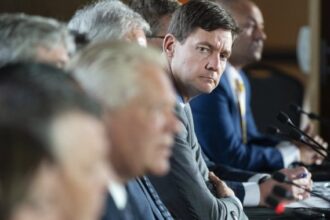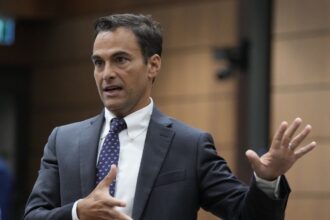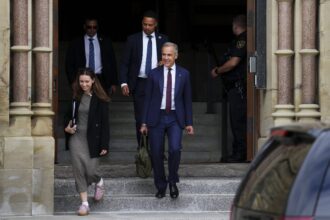In the shadow of Alberta’s polarized political landscape, a bold initiative to resurrect the Progressive Conservative Party has ignited intense discussion across the province. Former PC strategist Ken Boessenkool and political science professor Lisa Young have launched what many consider an audacious proposal—breathing new life into a political entity that dominated Alberta politics for over four decades before its merger with the Wildrose Party in 2017.
The initiative, detailed in a policy paper published by the Canada West Foundation, argues that Alberta’s political ecosystem has become dangerously bifurcated between Premier Danielle Smith’s United Conservative Party and Rachel Notley’s New Democrats. This polarization, the authors contend, leaves a significant portion of moderate voters without adequate representation.
“There’s a gaping hole in the center of Alberta’s political spectrum,” Boessenkool explained in a recent interview. “Many Albertans feel politically homeless—uncomfortable with both the rightward shift of the UCP and the progressive policies of the NDP.”
The proposal has generated considerable buzz in political circles, particularly among former PC supporters who never fully embraced the merger that created the UCP. The strategy involves reclaiming the PC brand, which remains legally available, and positioning the revived party as a centrist alternative focused on pragmatic governance rather than ideological purity.
Political analysts note the timing is strategic. With Premier Smith’s approval ratings fluctuating and internal UCP tensions evident, proponents see a potential opening. Recent polling data suggests approximately 30% of Alberta voters identify as centrists who feel underrepresented in the current two-party dynamic.
“The Progressive Conservative legacy in Alberta was built on balancing fiscal responsibility with progressive social policies,” notes political historian Roger Gibbins. “That middle ground has essentially disappeared from provincial politics.”
Critics, however, question the viability of this resurrection. UCP supporters argue that splitting the conservative vote would primarily benefit the NDP, while others suggest that the political landscape has fundamentally changed since the PC’s heyday.
“The challenge isn’t just about creating a party—it’s about rebuilding a coalition that can actually win seats,” explains political strategist Janet Brown. “The PC brand carries both valuable equity and considerable baggage.”
The initiative faces significant logistical hurdles. Beyond reclaiming the party name, organizers would need to establish constituency associations, develop a comprehensive policy platform, recruit candidates, and raise substantial funding—all while competing against well-established political machinery.
Former PC cabinet minister Doug Horner, who has expressed cautious interest in the proposal, acknowledged the difficulties ahead. “This isn’t about nostalgia or looking backward. If this moves forward, it would need to represent a modern vision for Alberta that addresses contemporary challenges.”
The proposal arrives at a time when political realignment is occurring across Canada, with traditional party loyalties shifting and new coalitions forming. Alberta’s economic transition away from fossil fuel dependency and changing demographics contribute to this evolving political landscape.
As debates continue about the viability of a PC revival, the fundamental question remains: Does Alberta’s political center have enough gravitational pull to sustain a competitive third party? In a province where political fortunes have historically shifted dramatically and unexpectedly, the answer may surprise us all.
















